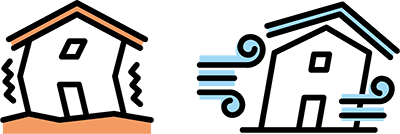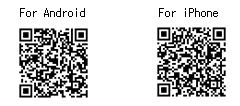1 Essential Information
1-1Emergency Contact Information

Emergency Numbers (Fire, Ambulance, Police, Other)
Police ………………………… 110
Fire or Ambulance ………………… 119
Police Box(Kōban):Police officers are stationed at small community police stations called kōban. Please consult them for lost items, street directions, or lost children.

1-2Illness or Injury
If you are sick or injured, visit a local hospital according to your symptoms. Large, general hospitals require a medical referral letter.
- Emergency Consultation Center (24-hour service, no holidays) (Exclusively Japanese-language service)
If you are unsure about visiting a hospital or calling ambulance services for urgent illness or injury, a nurse may offer advice on its urgency or necessity according to the symptoms. - If you need interpretation services, contact the hospital’s social worker.
- The Naka International Lounge can introduce hospitals and other services that offer language support.
1-3Government Administrative Procedures
- For events such as changing of address, births, deaths, marriages, or divorces, you must complete paperwork at the ward office.
- About one month after you register as a resident in Japan for the first time, you will receive notification of your My Number in the mail. It cannot be reissued, so please keep it safe. Once you receive the notification, you can apply for the My Number Card through your smart phone.
1-4About Residence Status and Residence Cards
- Educate yourself about residence status and your residence card. Make sure not to forget essential procedures.
- Those with non-working residence statuses such as “Student” or “Dependent” are required to get “Permission for Activities Outside of Residence Status” if they wish to work.
- For activities such as changing residence status or extending the period of stay, ensure that you complete the necessary documentation and procedures.
Immigration Information Centers
TEL:0570-013904Hours:Weekdays 8:30 a.m. – 5:15 p.m.
1-5Transportation(Rail, Bus, Car, Bicycle)
Trains
-
The rail lines JR Line, Municipal Subway Line, Minato Mirai Line, and Keikyū Line are in operation in Naka Ward.
You must buy a ticket with cash or use an IC Card (Suica, PASMO, etc).
Bus
-
In Naka Ward, the fare is paid in advance. You must enter the bus from the front door and exit through the back door.

The fare may be paid in coins, 1000-yen notes, or IC Card (Suica, PASMO, etc).
Car (Driver’s License)
- You must exchange your driver’s license to drive in Japan.
Bicycles
- When buying a bicycle in Japan, you must register it for crime prevention purposes. Please follow the bicycle-specific traffic rules.
1-6Housing Issues and Lifeline
- In Yokohama, there is municipally-managed housing and housing that is partially subsidized at the municipal and national level.
- There are places that offer assistance in finding housing.
- You must apply to the Yokohama Waterworks Bureau before you can start using the water.
- You must apply to an electric company to start using electricity and a gas company to start using gas. You can check with the realty company for details.
- Cell phones (such as smartphones) require a contract with a cell service provider. You must provide identification documentation (such as a residence card or My Number card) when signing a contract. You can confirm details with the service provider.
- You must register dogs at the ward office.
- There is a website describing necessary information for living a safe and happy life in Japan.
2 Disaster Preparation Information

2-1About Japan’s Earthquakes and Storm or Flood Damage
- Please prepare for natural disasters.
Japan is a country that often experiences natural disasters (earthquakes, typhoons, and heavy rain). -
When an earthquake occurs, protect yourself first.
①Crouch down ②Protect your head ③Don’t move until the shaking stops
2-2What to Do, where to Escape to, and What to Bring in a Disaster

- When disasters occur, there are locations to escape to (evacuation sites). Please confirm your local evacuation site.
- The evacuation location may change depending on if it is an earthquake, storm, or flood.
- Yokohama has a useful app for disaster preparation. (Safety Tips)
2-3Methods of Contacting Family and Neighbors
- Please decide in advance on a method of contact (SNS, message boards, etc.) and a meeting location in case of emergency.
- Please speak regularly with your neighbors and help one another in the case of a disaster.
- Please participate in your area’s local disaster preparedness training.
2-4Recommendations on Emergency Stockpiles and Other Information
- It is important to prepare regularly for disasters.
- Disaster Preparedness Information in Foreign Languages


